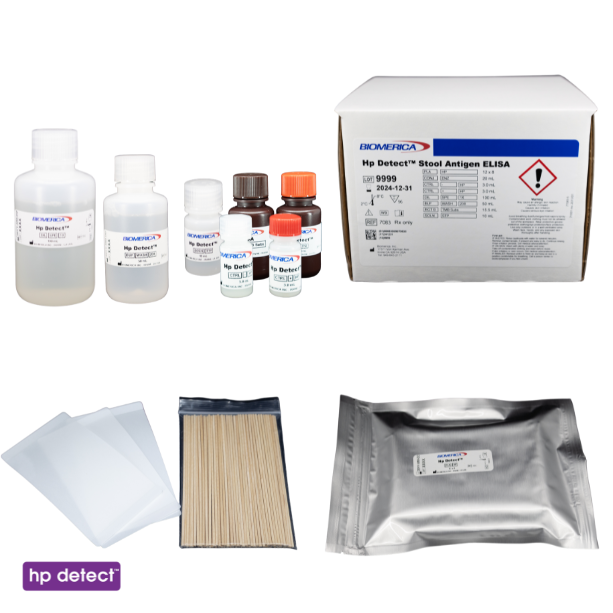Product Description
The Hp Detect™ Stool Antigen ELISA is an in vitro diagnostic qualitative enzyme immunoassay for the detection of Helicobacter pylori (H. pylori) antigens in human stool.
The assay is intended to aid in the initial diagnosis and post-therapy diagnosis of H. pylori infection.
The test may be used to assess H. pylori infection status after treatment. Retesting at a minimum of 4 weeks after the completion of treatment may be done to assess H. pylori status.
Test results should always be taken into consideration by the physician in conjunction with patient’s clinical information. For Prescription Use Only.
Features and Advantages Hp Detect™ Stool Antigen ELISA
Reliable:
- US FDA 510(k) CLEARED & CE MARKED
- Clinically proven
Equivalent Performance & Accuracy:
- 99% positive percent agreement with FDA cleared device
- 98% negative percent agreement with FDA cleared device
Excellent Performance Post-Therapy:
- Sensitivity and Specificity: both 100% 4 weeks after completion of eradication therapy
Simple to use:
- ELISA with strip design
- Ready-to-use reagents (except wash buffer)
- Positive and negative control
Convenient:
- Non-invasive for patient comfort
- Unpreserved frozen and fresh stool specimen possible
- Enhanced analytical sensitivity
- Superior assay reactivity: can detect 8 H. pylori strains
- Extended fresh specimen storage: 5 days at 2-8°C
- No Toxic Reagents (No Thimerosal)
- Prescription Use Only (USA)
- For Professional Use (CE Marking)

Helicobacter pylori
- Is a bacterium that colonizes the upper gastrointestinal tract
- Infects approximately 50% of world´s adult population
- Chronic inflammation caused by H. pylori induces pathologies like dyspepsia, peptic ulcer disease, gastric cancer and mucosa-associated lymphoid tissue (MALT) lymphoma
- Group 1 carcinogen designated by WHO
- 89% of all gastric cancers are attributable to H. pylori infection
- Among the 16 antibiotic-resistant bacteria
- Huge economic impact due to high healthcare costs and decreased productivity at work
Hooi, J.K.Y., et al., Global Prevalence of Helicobacter pylori Infection: Systematic Review and Meta-Analysis. Gastroenterology, 2017. 153(2): p. 420-429.
Sung H, Ferlay J, Siegel RL, et al. Global Cancer Statistics 2020: GLOBOCAN Estimates of Incidence and Mortality Worldwide for 36 Cancers in 185 Countries. CA Cancer J Clin 2021;71:209-249.
Dang BN, Graham DY. Helicobacter pylori infection and antibiotic resistance: a WHO high priority? Nat Rev Gastroenterol Hepatol. 2017 Jul;14(7):383-384.
WGO Global Guidelines Helicobacter pylori 2021


